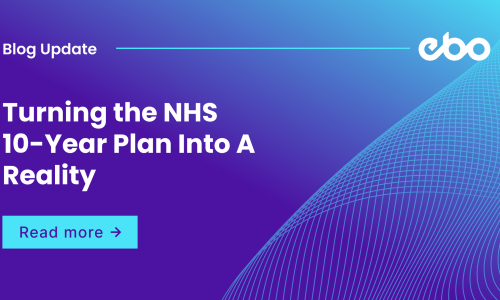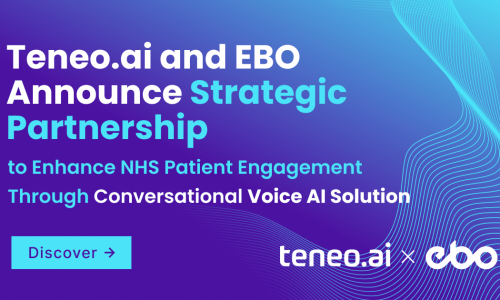EBO held a webinar in collaboration with Convenzis, to unveil its latest AI solution for healthcare: the Intelligent Patient Portal (IPP). Whilst patient portals have been around for years, this new solution aims to redefine patient engagement as we know it, by bringing AI and Conversational dialogue to the forefront.
Speakers from EBO, e18 Innovation and The Access Group, came together to discuss the IPP and its benefits to different sectors in healthcare. Read on to discover the key takeaways from the webinar.
Talk 1
Introducing the Intelligent Patient Portal – by Paul Boland, Healthcare Director of EBO

Paul Boland, EBO’s Healthcare director, began by explaining how EBO helps healthcare providers to automate patient facing processes end-to-end, releasing efficiency, increasing work capacity and reducing operational costs.
By leveraging the power of Conversational AI, EBO is reshaping patient engagement, creating a rich personalized experience for patients and lowering the bar for digital inclusion. This enables patients to take an active role in their healthcare journey, helping them to feel seen, heard and most importantly, valued and informed.
EBO has so far introduced its AI automation into numerous NHS Trusts across the UK. At Somerset NHS Foundation Trust, for example, EBO is managing over a thousand outpatient booking conversations per month, 40% of which are handled out of office hours. At Shropshire Community Health, EBO is automating patient engagement for school age, immunization and vaccinations, achieving 100% adoption rates and 95% positive feedback rates. Finally, at Betsi Cadwaladr University Health Board, EBO is saving an estimated £137,000 per waiting list validation cycle.
A deep dive into patient engagement
“So, what have we learnt from these projects?”, Paul asks. EBO has learnt that enhancing patient engagement is not about installing technology but it’s about enabling methods of communication that work for the patient and It’s about having meaningful conversations with empathy.
Paul goes on to say that, “as citizens, we want to be able to manage each aspect of our lives in a way that fits around our busy schedules. This means having access to effective digital channels that work. We expect the experience to be simple, convenient and straightforward. After all, that’s how the modern world works. The same applies to healthcare”.
Transforming Traditional Patient Portals
When it comes to patient portals, Paul explained that traditional portals have faced challenges in the past, achieving very low adoption rates of 15-20%. Statistics show that 32% of portal visitors leave after viewing just one page (normally, the homepage), stating that, “It’s unlikely that they’re going away from their portal fulfilled”.
“We can and must do better. Patients expect more from their digital experience”.
So, how can this be improved? How can we create a portal that will benefit both patients and staff significantly and make managing the healthcare journey simple? EBO’s Intelligent Patient Portal aims to address these issues by offering a second-generation solution with built-in artificial intelligence. This technology not only enhances engagement but also simplifies the user experience. Below are some of the Intelligent Patient Portal features:
Language Inclusivity
EBO’s solution offers support for multiple languages, effectively reducing language barriers. By using natural language processing and proper dialogue design, patients can engage in their preferred language, increasing accessibility and improving the patient experience.
Restoring Empathy
EBO’s approach aims to restore empathy in healthcare interactions. Through language recognition and context understanding, the portal provides intelligent, empathetic responses – a crucial aspect that is often overlooked in digital healthcare solutions.
Rich Data and Insights
The EBO Intelligent Patient Portal is equipped with sentiment analysis, providing administrators with valuable insights into patient behavior and preferences. Real-time visual dashboards allow healthcare providers to stay on top of patient interactions.
The Future of Voice Technology
The EBO Intelligent Patient Portal is equipped with sentiment analysis, providing administrators with valuable insights into patient behavior and preferences. Real-time visual dashboards allow healthcare providers to stay on top of patient interactions.
Continuous Improvement
The portal’s machine learning and language recognition capabilities enable continuous improvement. It adapts to complex tasks and increases the value it provides to patients over time.
Supporting Adoption
EBO doesn’t just provide technology; it offers ongoing support for adoption. It works closely with healthcare organizations to ensure the successful implementation of the solution and drive long-term results.
A Transformative Partnership
In closing, Paul emphasized that adopting the EBO Intelligent Patient Portal isn’t merely about adopting a new tool. It’s about fundamentally changing the way healthcare providers engage with patients, bringing back the human touch to healthcare and creating a better healthcare system for all.
Talk 2
The Intelligent Patient Portal in the context of the ICS– by Kerry Morgan, Customer Success Director, e18 Innovation

In the second talk, Kerry Morgan, Customer Success Director at e18 Innovation, took the stage to discuss the potential of the Intelligent Patient Portal within the realm of an Integrated Care System (ICS).
Kerry began by introducing e18 Innovation and its recent partnership with EBO, emphasizing both company’s shared values and dedication to harnessing technology for better patient outcomes and experiences.
“The intelligent patient portal is a key digital transformation tool that we can offer to the NHS”
The ICS Automation Maturity Journey
Kerry delved into the automation maturity journey that the ICS follow, stating that most ICS are currently in the early stages of automation, primarily using technology to improve efficiency at the individual organisation level. The transition to more advanced stages, where technology is used to transform system-wide processes and patient pathways, is the ultimate goal. Kerry moves on to say that EBO’s Intelligent Patient Portal is seen as a valuable addition to complement other automation technologies and drive the ICS towards more advanced stages.
Challenges Faced by the ICS
Several challenges confront the ICS, Kerry continues. These include conflicting priorities within the NHS. Short-term goals like recovery, funding, and reducing waiting times often compete with the long-term objective of providing seamless, patient-centric care. Additionally, various organizations within the ICS rely on different systems that do not communicate with each other. This results in patients having to repeat their information to various healthcare workers, leading to a poor patient experience. However, technology like the Intelligent Patient Portal can help address these issues. Thanks to the EBO’s interoperability and context awareness, the IPP can keep track of patient’s data and personalise conversations. Patients can hop from one pathway to another without needing to start all over again or give any context – just like speaking to a human!
The Benefits of the Intelligent Patient Portal
Kerry highlighted the numerous benefits of the Intelligent Patient Portal, including its 24/7 availability. Patients no longer need to wait for office hours to access information. This accessibility enhances communication between patients and healthcare providers.
The portal’s ability to continuously learn and adapt improves patient interactions and empowers patients to take an active role in their care. It reduces the risk of human errors and enhances data management across the ICS. Moreover, it helps ease the workload for staff, allowing them to focus on patient care.
Data security is a paramount concern, and the Intelligent Patient Portal ensures secure and encrypted data handling, facilitating easy auditing.
A Transformational Technology
In summary, the Intelligent Patient Portal, when used alongside other automation technologies, can help ICSs operate more efficiently, enhance patient experiences, reduce costs, and deliver personalized, patient-centered care. It aligns with both short-term and long-term NHS goals, ultimately transforming the healthcare landscape.
Talk 3
RIO Virtual Assistant: The Inclusive Solution - A talk by Ron Burdis, Business Consultant, The Access group

In a recent webinar, Ron Burdis, a business consultant from The Access Group, took the stage to discuss the groundbreaking capabilities of the Rio Virtual Assistant. Ron’s presentation shed light on how this innovative technology is poised to transform patient engagement and streamline healthcare processes. Here are the key insights from his talk:
Introduction to The Access Group
Ron started off by introducing The Access Group, one of the UK’s largest business management solution providers, which aims to enhance business management and improve customer/patient satisfaction across a variety of industries. Three years ago, The Access Group entered into a strategic partnership with EBO, recognising the unique and pioneering aspects of EBO’s technology, particularly its conversation-based approach. This robust partnership resulted in the creation of the Rio Virtual Assistant – an AI tool that integrates with the company’s products.
Today The Access Group works closely with EBO to develop integration engines that facilitate connections with EPR platforms, NHS apps, third-party portals, and other essential healthcare systems. This integration empowers both patients and healthcare professionals by enabling seamless data sharing and updates.
Deployment of the Solution
Ron explained that the Access Group harnesses the power of the EBO platform to manage key areas, including conversation, communication, business rules, workflow, and integration into various systems. This approach ensures a seamless end-to-end process that allows easy access and data management, rule automation, alerts, multichannel communication, and a comprehensive reporting system.
Ron moved on to discuss the functionalities of the Rio Virtual Assistant, emphasizing its role in facilitating interactions between patients, staff, and healthcare processes. The system is capable of handling a wide range of tasks, from appointment scheduling, consent forms, and self-referrals to clinical assessments, wellness assessments, and more. It streamlines the patient’s journey and ensures a smooth and efficient experience.
The Rio Virtual Assistant isn’t limited to patient interactions; it also serves as a valuable tool for staff engagement. It supports mobile workers, task management, clinical assessments, staff communication, digital marketing campaigns, and automated FAQs. The solution is also seamlessly integrated with MS Teams, fostering collaborative staff engagement.
The Access Group’s integrated care platform focuses on providing a patient-centered approach, with automation embedded throughout the entire care pathway. It ensures a smooth transition from initial appointments to discharge and interfaces with local government, healthcare, and various service providers to streamline the patient’s journey.
Conclusion
In conclusion, the Rio Virtual Assistant, powered by Ebo’s innovative technology, is set to revolutionize healthcare processes by simplifying patient interactions, enhancing staff engagement, and automating critical healthcare tasks. This presentation offers a glimpse into the future of healthcare management and patient care, driven by the capabilities of the Rio Virtual Assistant.
Start your AI automation journey today by speaking to a member of our team. Contact us and we will be in touch.


